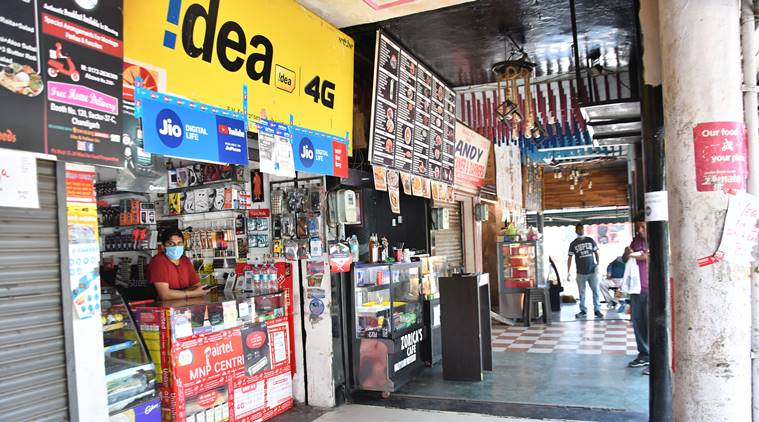 In Dahanu town, while shops selling sweets, fried snacks, garments, construction material, hardware and electrical goods were all open, business was sluggish on Saturday. (Representational/Express Photo)
In Dahanu town, while shops selling sweets, fried snacks, garments, construction material, hardware and electrical goods were all open, business was sluggish on Saturday. (Representational/Express Photo)
ON JUST the second day since shopping and unrestricted movement of people were permitted in non-municipal corporation areas, the reality dawned on shop owners, traders, mechanics, tailors, hawkers and gig economy professionals, such as plumbers and electricians, that the road to normalcy after the lockdown will be a long one, especially in tribal-dominated Palghar district where seasonal unemployment and landlessness are common.
In Dahanu town, while shops selling sweets, fried snacks, garments, construction material, hardware and electrical goods were all open, business was sluggish on Saturday. In Talasari town, shops remain under an extended lockdown after some local residents were found to be contacts of Covid-19 patients across the state border. The industrial township of Boisar wore a deserted look, with much of its migrant population having left, while Palghar town, having enjoyed brisk sales on Friday, the weekly market day, retreated behind downed shutters as shoppers stayed away on Saturday.
In Palghar city, Nagendra Bhagat is a roadside vendor of undergarments. He has taken a loan to restart business with some new goods he procured with difficulty from traders passing through the region. Back at work since Friday, Bhagat expects further deep losses before things start looking up, at least until the resumption of local train service, a lifeline for his business and that of lakhs of other small traders in the suburbs.
“I usually buy my goods from Dadar, riding the train back and forth. In fact, many others who sell low-priced garments in Dadar also use local trains. So until trains begin regular services, my business is crippled,” Bhagat says. He plans to continue purchasing from elsewhere, but that renders his goods costlier, and he expects there will be no buyers. “People are struggling to eat, obviously nobody’s going to buy new underwear unless it’s an absolute necessity,” he adds.
Bhagat does not know that the men’s innerwear market has shown poor performance since late last year, a sign of shrinking disposable incomes, but he acknowledged that business was already down before the lockdown. “Now I’m just sitting all day, not a single customer,” he says.
The absence of demand cuts across sectors. In Palghar, young Sharay Shah, who runs the family business of selling cement and reinforcement material for concrete, says cement retail is now doomed until Diwali. “We are seeing about 30 per cent of normal business for this time of the year,” he says. According to him, with the monsoon coming, demand will dry up completely in June. He says he is facing a shortage of labourers at his Sri Adityanath Cement Agency, with six or seven of his usual daily wage workers having returned to Bihar and Uttar Pradesh early this month. Shah expects to have to wait until 2021 before making any fresh profits.
In Dahanu, K Patel of Geetanjali Associates is getting labourers to unload a truck of cement bags that has just arrived. “We have a few orders, but our trade is limited to local home repairs, local minor construction requirements. Only absolutely essential works are being undertaken now, and those orders will disappear in June,” he says.
In Ganjad village near Dahanu, Ladkya Rohankar has been a tailor since the early 1980s, slowly establishing a little shop from where he retails school uniform, colourful skirts, sarees and, just added to their stocklist, gaily printed masks for Rs 20 apiece. “That’s the only thing selling,” he says. A Warli adivasi, his family-owned land is only a small safety net and Ladkya and his son depend on the shop for their livelihood. “The schools being shut has hit me badly, no uniform sales will take place. We’re just staying open to catch whatever little business is available,” he says. He is hopeful of selling a few knee-length skirts as they are popular during the monsoon.
The border taluka town of Talasari, however, will resume economic activities only on Monday. The town was put under a few additional days’ lockdown as a cautionary measure after 30-odd local residents were traced as contacts of traders and workers, who tested positive in Vapi, Gujarat. Tehsildar Swati Ghongde says works under the employment guarantee scheme are underway everywhere, to put some money in the hands of very poor adivasi families.
“The fishermen have returned early. Others who are seasonal labourers at brick kilns have also returned early, so we can expect them to run out of savings in the coming months. That’s when we could see some more distress,” she says. Conversely, 250 to 300 workers who left Talasari for their native place have also left behind some jobs for local residents, she adds.
At MGNREGA sites and elsewhere, women are hard at work. Shobha Mohite of Siddhivinayak Small Savings Group in Ashagad village near Dahanu reopened their breakfast snacks outlet, dishing out poha and vadas, with a small bottle of sanitiser at the delivery counter. “Just watching everybody using sanitiser frightens me,” she says, “but we’re hopeful that food is something that will bring people to the stores.”